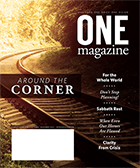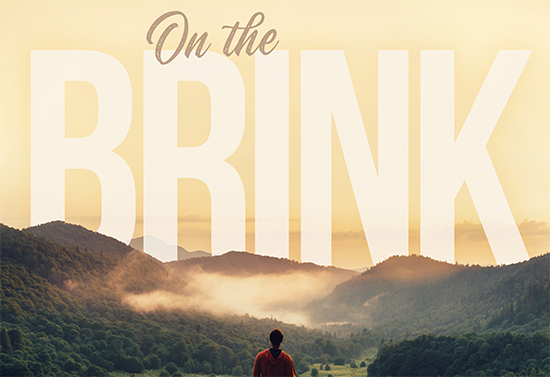
October-November 2020
Around the Corner
------------------
|





On the Brink
By Brenda Evans
In a rhythmic Southern drawl that fell away on the last word, Shelby Foote said, “Man is the only animal that knows he is going to die.” Mr. Foote was 85. A novelist, historian, and human being, he seemed to know he was on the brink, a half-step from a drop-off, a verge and portal to somewhere else. He lived four more years.
A brink can feel ominous. The first time I stood at the edge of a mile-deep precipice was the summer of 1970 at the Grand Canyon. The calves of my legs felt weak, unable to hold. I saw I could topple, fall into it. The Canyon is spectacular and unforgettable, but plunging head-first into it is another thing altogether. The same is true with death. I’m on its brink.
Recently in the Pentateuch and Joshua, I was reminded the Israelites knew a lot about death and also what a brink is. By my count, from Exodus to Deuteronomy the people mention death or dying more than two dozen times. Moses mentions death more than a hundred.
In Joshua, they were on the brink of the Jordan, ready for Canaan, and they are reminded to watch the Ark of God’s presence, “for you have not passed this way before” (Joshua 3:4). I like the parallel. On the threshold, not of death but of a new land and new life, the Lord showed them the way to go. Wherever we Christians are in this crowded world, we are on a brink of one kind or another. We older folks believe we are near the brink of death. We have not passed this way before, but we will be shown the way.
At the brink of the waters, the priests were to stand still. Waiting on the edge of death for safe passage is an action of faith. And, waiting does not mean doing nothing. Today, I plan to cook, do laundry, do dishes. Maybe I’ll start the research for an anthology project due late this year. Then there is the 1000-piece jigsaw puzzle spread out across the dining room table, 200 pieces still remain to be inserted in the right places. It’s Machu Picchu—all browns, tans, grays, with variated greens here and there. Complicated, confusing. A piece seems to fit but doesn’t—like life on the brink.
Wait is a hard word. When there’s a dilemma, we “fixers” get fidgety. But on the brink, we’re told to wait, to hold our peace. It’s even harder on the verge—whatever that verge is. Not all verges forebode death. Some may be harder than death.
Every few years, I read actuarial charts, which may or may not be a good idea. Death is not a taboo subject at our house. I won’t die sooner just because I talk about it. Today, I read the chart. I’m expected to die in 10.8 years. Recently, Bill and I revisited our dying plans. We do that periodically. This time, we gathered and made copies of the documents our executor son Lee will need when we die. We spent several hours with him. He is legally prepared for our deaths.
In addition, we reviewed the two-page list of 20-or-so things I’ll need to take care of if Bill dies before me. The list has helped me emotionally and spiritually. It is a comfort. Statistically, widows outnumber widowers in the U.S. The last census revealed 11 million widows and 3 million widowers. Bill is “predicted” to die before I do. If he does, I will become what one writer crassly called “that surplus of women.”
Whatever the case, the number 10.8 glares at me from the white page of the Actuarial Life Table. It’s from the Social Security Administration, downloaded from the web. SSA labeled it a life table, but it’s a death table to those of us who read it.
So, what is 10.8 years, or what is any number? I looked up number in my old, red Webster’s. As a noun, Webster defined number in 333 words in fine, fine print, most so technical I don’t understand them. As a verb, number is simpler. It means to count, enumerate, total. Until today, I’d never thought about how abstract or non-representational a number is. If I paint a huge 10.8 on my office wall, it doesn’t depict what my life will be the next 10.8 years. It’s a symbol that represents time, not me, the person. But if I reduce 10.8 years to weeks, it somehow feels less abstract—but also short. In fact, 570 weeks feels very short.
Mulling too much on 570 weeks could make my days a “troublous time,” to use an old John Maynard Keynes term. Actuarial charts are statistical estimates or calculations about probabilities or possibilities. More than a guess, but not a certainty. Whatever the years or weeks, studying a mortality chart too glumly can be dabbling in mud and getting smeared with the stuff. I must admit my mortality, but I don’t have to wallow in it.
Right now, death doesn’t feel imminent, though it may be. So, what should I do on the brink? You may thumb your nose at my opinions, but here are six of them anyway.
-
Grow—don’t fall—into old age and death. Near the end of his life, Shakespeare’s hard-nosed King Lear tells his daughter Cordelia he will ask forgiveness, laugh and talk, and pay attention to the “mystery of things.” But Lear had waited too late. His end-of-life plan failed. He quickly fell into death. I want to grow toward death, to be a tree beside a stream, to leaf out and bear fruit to the end (Psalm 1:3).
-
Live in hope. That means ditch my dismal worst-case-scenario attitude. Instead, decide God will do a good thing in me. Whether we walk, run, or wheel, we can move along in hope, for now, not just for the future. On a blizzardy day in 1980, we buried my 70-year-old father. Snow was eight inches deep in Middle Tennessee. Blood-red clay mud rose in mounds around the grave. Flowers froze into pink and yellow and purple ice crystals. Friends and relatives gathered under a green tent. Mother, my sister Grace, and I shivered and wept quietly. Yet, the resounding gong of God’s Word rose in my head: we sorrow not as others who have no hope (1 Thessalonians 4:13). Hope did not arise on the day Daddy was buried. It was already there—in Daddy and in us. Someone rightly called hope a high form of faith, a rational confidence in the now-and-forever work and presence of a loving, Almighty God.
-
Copy down the Lord’s promises. I’ve written 92 Bible verses in a tiny notebook. It’s three-quarters full. I’ll start another when these pages run out. The notebook is small, but the promises are large. They keep my eyes on the God who has my name written on His palms (Isaiah 49:16).
-
Wait—pause in readiness. We may be at the brink of death, or we may not be. How can we know? Either way, wait doesn’t mean hang around expecting the worst. It means growing in confidence that while I wait, the Lord sees and upholds me with His righteous right hand (Isaiah 41:10).
-
Speak gratitude. Gratitude is a practice, an attitude, a settled way of thinking, and not just a feeling. It is not about bucking up; it counts blessings, not burdens. Gratitude looks back and up. With clear eyes, gratitude recollects, gives thanks for the Lord’s gifts of every imaginable sort, in the past and now.
-
Pray the Hebrews 13:20-21 benediction (paraphrased): God of peace, equip me, and work in me that which pleases you through Jesus Christ. Amen.
About the Writer: Brenda Evans lives on the banks of Rockhouse Fork Creek in Ashland, Kentucky. You may contact her at beejayevans@windstream.net.
|
|

